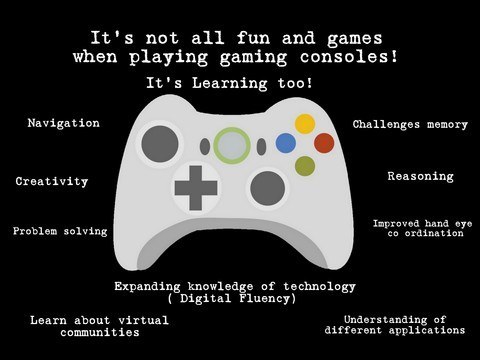
Parents are always wanting us off our games. They think video games do nothing but rot our brains -- that gaming is just some entertainment tool to keep us from the outside.
Kids and teens often have a dilemma about how to convince their parents that gaming is actually good for them. Well, I’m here to assure you, you are right! Here are five things video games help you improve as you play them. Each of these things can be used to convince your parents that you don't need to turn off the console just yet. (Sorry, but not sorry to parents of gamers.)

Educational Gaming
Let’s get through the boring way video games can help children first. Shooter and RPGs are all fun, but there are actual educational games out there. If your child is having trouble in math or any other curriculum, there is most likely a game out there to help with that. MIT actually has an education arcade website devoted to creating great games that also teach as the player plays. There are multiple sites like FunBrain and the well know PBS Kids that put free games out there for students to learn. Though, this may not be what kids want to do with their video games. It’s something parents should consider when buying games for children.

Life Adjustment
Phew, now that we got past the boring stuff, let's jump into the more exciting knowledge about video games. A psychologist by the name of Dr. Andrew Przybylski did a study involving 5,000 children ages 10 to 15 years old that determined how well-adjusted children are that play video games.
Children who played less than an hour a day gaming were better adjusted than children that don’t play video games. Those children who played more than three hours experienced lower satisfaction in their lives. So limiting children’s gaming is fine, but gaming can help with children to be well-adjusted in life.

Motor Skills
Another study was done with children ages three to six years old by researchers at Deakin University. The study involved interactive gaming, like the Nintendo Wii. It shows how interactive gaming actually helps a child develop their object control motor skills, like kicking and catching. Children who played non-interactive games didn’t gain any advantage in this department. So if your child is playing the Nintendo Wii and causing a lot of noise, just let it go. They are developing some useful motor skills.

Improves Vision
Something that parents may not expect video games to do is improve our vision. First person shooters, specifically, improve our sensitivity to contrast. Normally we might need to get glasses after staring at a high contrast screen for long periods of time. But apparently first person shooter games actually improve a gamer's vision, even months after they have stopped playing. It increases visual attention while decreasing visual crowding. Daphne Bavelier at the University of Rochester even talks about how these games could be “useful in complement to eye-correction techniques”.
So parents -- stop worrying about your child playing all these first-person shooters. They are actually helping your young gamer.

Quick and Precise Decision-Making
Finally, the last piece of evidence you need to convince your parents that gaming is actually good for you...
Action video games can actually improve your decision making. Not only does it influence your ability to make the right decision, it also affects how fast you're able to do so. This helps for things like driving, multi-tasking, and navigating around town. Driving, for example, tends to need some quick adjustments in case of emergencies. Similarly, FPS players need to act quickly -- or else they may get killed. While driving, a quick decision could save your life and others' lives. Whether to brake or not brake is like trying to decide whether to shoot or not to shoot in a game. And being able to make that decision in-game may help your ability to make in in real life.
Multitasking is also a valuable skill. When you go to college, for example, and have multiple assignments to do, or when you're trying to manage multiple jobs, responsibilities, or hobbies, you have to be able to multitask. FPS players have to watch themselves, their teammates, their map, their ammo levels, their health, and so much more as they're playing. It really helps build that multitasking skill.
As long as you can remember to put down the controller/keyboard long enough to do what you need to do you should do well.
What other reasons would you use to convince your parents that gaming is good for you? Let us know in the comments!







Published: Nov 24, 2015 12:17 pm